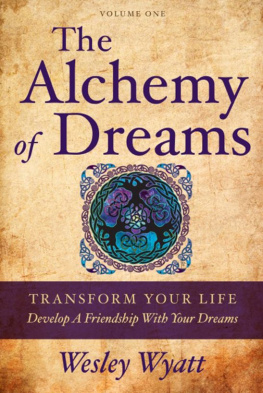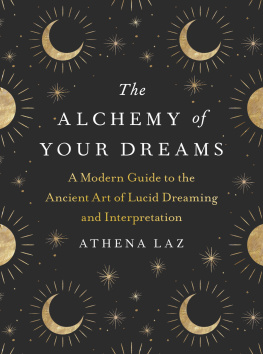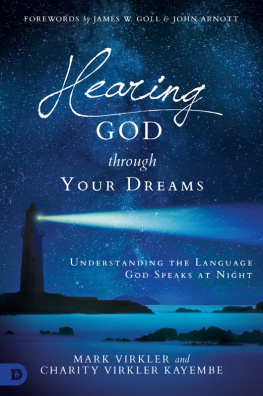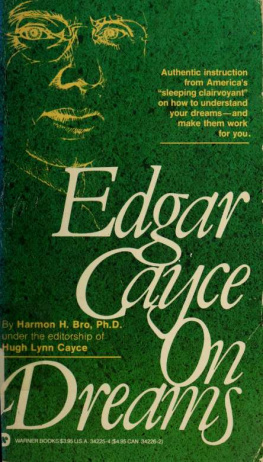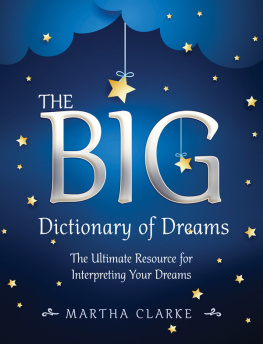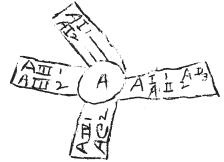Volume One
The Alchemy of Dreams
Transform Your Life - Develop A Friendship With YourDreams
By Wesley R. Wyatt
Copyright 2013 by Wesley R. Wyatt
Smashwords Edition
All rights reserved. No part of this publication may be reproducedor transmitted in any form or by any means, electronic ormechanical, including photocopy, recording, or any informationstorage and retrieval system, without permission in writing fromthe copyright owner.
Edgar Cayce Readings 1971, 1993-2007 by the EdgarCayce Foundation
Cover Image
Yggdrasil World Tree by Jen Delyth 2002 www.celticartstudio.com
Interior Image
Anu Earth Mother by Jen Delyth 2002 www.celticartstudio.com
TABLE OF CONTENTS
Preface
For thefirst 16 years of my life, I had no inkling of the value of dreams.Those around me rarely acknowledged them unless one wasparticularly disturbing, weird, or funny. I was never encouraged tomake an effort at recalling them, nor did I entertain thepossibility that they contained useful information, much lessinspiration. Though I was aware that many indigenous culturesvalued dreams and dreaming as a means of communicating with thespirit world and the Divine, such concepts were not reinforced bythe culture in which I grew up.
Then, when I was 17, my brother brought meseveral books about the famous psychic Edgar Cayce. Initially I wasskeptical, but then I realized that he believed hed foundsomething of great value, and I began to ask more seriousquestions.
Who Was Edgar Cayce?
Much of the information provided by EdgarCayce (while in a self-induced sleep state) was on health issues,and in many cases, documented evidence backed up its accuracy. Theidea that research could prove the veracity of the informationreceived by a psychic intrigued me. If this was true, maybe mybrother had not gone off the deep end after all.
My brother went further, stating that many anindividual, upon following the suggestions given by Edgar Cayce,had either been cured or had their health improve in remarkableways - despite their doctors having describedtheir condition as incurable . Even those who were initiallyskeptical were won over by the results they experienced infollowing Cayces suggestions.
At this time, my brother wisely decided toleave a few books with me, rather than trying to convince me.However, once he left I found the information so fascinating that Idevoured the books like a starving man.
My greatest interest was Caycescomprehensive overview of how the body, mind, and spirit workedtogether to sustain or hinder health. I was also intrigued by theconcepts highlighting mans purpose in the earth, and ourculpability for what each of us experiences. Given the results ofthose individuals who had followed Cayces advice, I felt compelledto consider the possibility that Cayces comments on other topicsmight be just as legitimate.
The more I read, the more astonished Ibecame. Here was information that avoided the simplistic and narrowanswers to lifes complexities that I had previously found sounacceptable. I was moved and inspired by the rich tapestry ofharmonious laws that were described as governing our existence.
Individuals were seen as the co-creators of their experiences. Free will wasaffirmed as the central gift of the Creator, whereas suffering wasthe result of the misapplication of will and desire.
Edgar Cayce affirmed that there is only one force in the universe, a force that manutilizes for good or ill. The concept provided answers to troublingquestions. Cayce stated that each of us has the choice either toalign our will with Gods laws (love) or suffer the consequences.In short, the Edgar Cayce readings affirmed over and over that oursuffering and the problems of the world were man-made, the resultof our failure to choose love over hate, kindness over intolerance,peace over war.
No wonder our experiences are often sochallenging. In refusing to accept responsibility, and in ourfailure to recognize the power of our minds in creating thecircumstances of our lives, we create the illusion that werevictims.
How many of us are willingto look at our illnesses, our problems, and our suffering as causeand effect?
The prevailing attitudes of most cultures,religions, and scientific disciplines dismiss the concept thatattitudes and beliefs directly create our experiences. In ourfailure to understand our culpability, we miss the opportunity to consciously participate in creating a moremeaningful life. Our inability to accept responsibility results inour remaining unconscious of our own power.
Though such a concept made sense to me, myinitial excitement quickly gave way to a more grounded response. How did such a concept apply to me personally, tomy life and my experiences?
My brother and I had both experiencedtraumatic childhoods. Being exposed to the concepts presented byEdgar Cayce challenged me to take greater responsibility for myexperiences. As a result, my previous attitude toward my childhoodexperiences began to change, from feeling victimized to wonderingwhat I needed to learn from them.
Another concept at the heart of the Cayceinformation was the comforting concept that God (often described as the Creative Forces) was aware of, andresponsive to, all of us. If we willingly asked for help andincreased our receptivity, help was always available.
Once I began to seriously study the Cayceinformation, a fire was lit within me. I felt like a miner in thebowels of the earth who, after wandering in darkness for years,suddenly turns a corner and finds a bright shaft of lightilluminating the path before him. I began reading everything Icould get my hands on about the philosophy and concepts presentedby Cayce, including his statement that people should pay moreattention to their dreams.
Dreams, then, that come to theentity, may be the correlation of any or all of these faculties,and should be made record of, else the physical in gaining itsequilibrium often loses much that may be worth while to the mindsof many individuals who will hearken and apply the same lessons andtruths as gained from same to their individual lives. - 294-46Edgar Cayce Reading
I learned from my reading that, althoughEdgar Cayce died in 1945, there is still an active organization,the Association for Research and Enlightenment (A.R.E.), as well asa library in Virginia Beach, Virginia devoted to spiritual andmetaphysical topics from all over the world. However, I was mostintrigued by his primary legacy, the more than 14,000 psychicreadings and supporting documents that were available to thegeneral public for research.
As I became more familiar with many of theconcepts presented in the Edgar Cayce readings, I began to applythem in my own life. They offered a vision of life that I hopedwould assist me in leaving the dark passage of my childhoodbehind.
I began placing a dream journal at my bedsideand recording any dreams I recalled. I became more self-reflective,in an effort to accept more responsibility for my attitudes andactions. I also began to ask for help, to test Cayces affirmationthat prayer was powerful.
Nevertheless, I still harbored doubts. How, I wondered, could I prove not only theveracity of the concepts, but also that the source of theinformation was legitimate?
Then, just before my high school graduation,my brother informed me that he had decided to move to VirginiaBeach in order to research Edgar Cayces readings in person. Thiswas a momentous decision and, to my surprise, he acted on it. Forhim to move 2000 miles away to research a psychic really got myattention.
Six months later, he sent me another book, Season of Changes. It contained informationreceived by another psychic, one who was still living. The book notonly provided a complementary perspective to Cayces; it also mademany of the concepts more understandable. The book affirmed, onceagain, that dreams were a potential avenue for receiving guidanceand inspiration from the Divine:

